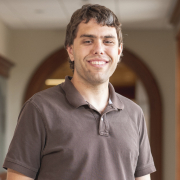This fall, Silas Johnson and Tabea Alexa Linhard were among 24 Arts & Sciences faculty to pilot the new Literacies for Life and Career initiative, which focuses on highlighting and developing key skills.
As a lecturer in Calculus I, one of Washington University’s largest introductory-level math courses, Silas Johnson has heard dozens of variations on the same question: “Why are we learning this?”
With an enrollment of close to 300 students from a variety of different degree tracks, it’s easy to understand why this age-old math student question continually comes up in Calc I.

“I’m not sure what percentage of my students are going to directly apply the exact content that I’m teaching them,” Johnson said. “But they’re going to learn problem-solving skills and a comfort with abstraction. They’re going to learn how to put the pieces together and develop a complex idea. They’re going to learn logical reasoning. All of these are things that we think are important as mathematicians – not necessarily the actual mathematical statements.”
The Literacies for Life and Career initiative struck an immediate chord with Johnson, an educator well-versed in explaining the "why" of coursework to his students. This fall, he became one of 24 Arts & Sciences faculty to pilot the new Literacies program in his Calc I classroom.
Developed as a signature initiative of the Arts & Sciences Strategic Plan, Literacies for Life and Career aims to make the full value of a liberal arts and sciences education more transparent by providing a framework for undergraduate students to identify a key set of skills, or literacies, that will prove indispensable in their lives and careers after graduation.

These literacies are already present in the Arts & Sciences undergraduate curriculum – skills like applied problem solving, creative practices, and integrative thinking. The initiative aims to foreground these ideas for students while helping faculty to become more intentional in highlighting them in courses.
“A liberal arts and sciences education has immense value,” said Erin McGlothlin, vice dean of undergraduate affairs in the College of Arts & Sciences. “It’s absolutely critical for understanding the world that we’re in, but students aren’t always aware that they need what we’re teaching them in order to engage as fully ethical, active, and informed citizens. We felt we needed to be better about making those things more concrete for them.”
Literacies for Life and Career took a long, deliberate road before its first appearance this fall in “early adopter” classrooms like Johnson’s. That included engaging in benchmarking and analysis of peer institutions, analyzing more than 100 WashU courses with the help of 10 faculty literacy fellows, and narrowing down an initial list of 300 potential literacies to a provisional list of 14.
Once Johnson and the cohort of early adopters signed up to test-drive the literacies model, they underwent multiple rounds of training to exchange ideas in preparation for the fall semester. Training sessions equipped each faculty member with the tools to identify and augment literacies in their courses without radically reimagining their approach to teaching.
“Teaching is such a constant learning process,” said Tabea Alexa Linhard, director and professor of Global Studies and another member of the early adopter group. “But I also admit that we do get rusty sometimes. We’re so busy, we’re doing all these other things, and you get stuck in the same routines. That’s one reason why I decided to participate in this. I thought, ‘I’ve been doing this for a long time, and I probably need to look at it from a different perspective.’ It doesn’t take much, and you get a lot out of it.”
For Johnson, piloting literacies in his course gave him the chance to redesign Calc I’s discussion subsections, where smaller groups of students gather outside of main lectures to refine their skills.
“What we normally do is just give them a big list of practice problems and say, ‘Practice with these,” Johnson said. “And that proved to be kind of boring – they can do that at home. So this was a neat opportunity to spice it up a little bit.”
Instead, one Calc I assignment designed to follow the Literacies approach had each member of a discussion group become the “expert” in a specific problem, and then communicate their technique for solving it to the rest of the group while another student documented each step of the process. By making his subsections more collaborative, Johnson was able to implement literacies like communication dexterity and collaboration and leadership.
An added benefit of the early adopter process, Linhard says, has been the cross-pollination of ideas between her and colleagues in other departments. In fact, she and Johnson learned a lot from each other during early adopter trainings despite working in completely different fields of study.
“I was always so terrified of math,” Linhard said. “But he has taught me that math doesn’t have to be that scary. He has also given me really good feedback on some of the exercises that I’m doing for my Global Futures class, which has nothing to do with what he teaches. For me, the most valuable thing from all the different initiatives of the Strategic Plan has been having the chance to talk to my colleagues that I wouldn’t talk to otherwise.”
The next step for the Literacies program is to scale up toward the goal of application in all Arts & Sciences undergraduate courses. As important as faculty buy-in is, McGlothlin says, the real success of the program rests on its impact on students.
“By the time we have students going through four years of this initiative, and going through all the reflective exercises that we’re building into it, the ultimate success will be that students can articulate the value of what they’ve learned above and beyond their major,” McGlothlin said. “This is really about how we can more effectively help our students to understand what we’re already teaching them.”
This week, the implementation team will announce a call for applications for the second round of early adopter grants, allowing faculty to contribute to shaping the initiative by piloting literacy-based strategies in their 2024-2025 academic year courses. To learn more about being an early adopter of the initiative, Arts & Sciences faculty are invited to join the Literacies for Life and Career implementation team for an information session on Friday, Dec. 15 or Thursday, Jan. 18.




